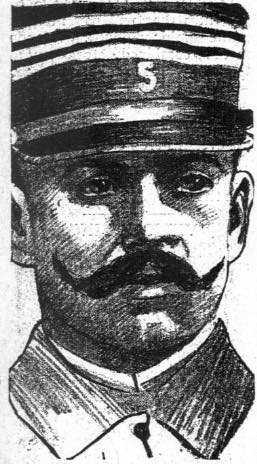
Give a person enough time and enough boredom, and they will figure out an escape. This interesting newspaper article from 1912 tells how a French captain escaped a German fortress prison. While he had plenty of help from the outside world, the time spent planning his escape and turning it into a reality is not for the impatient.

Truth As Thrilling As Fiction In The Escape Of A French Officer From A German Prison
The romantic escape of Captain Charles Lux, the French military officer from the strongest and most carefully guarded of German prisons may result in complications between France and Germany. The French are hilariously joyful over the daring escape; the Germans would wring the captain’s neck if they could get him back.
Lux was caught in Germany, convicted as a spy and sentenced to a six year term in the German fortress of Glatz.
In Paris were staunch and true friends of the imprisoned officer, headed by Dr. Grelley. They wrote interesting, unsuspicious letters to Lux. These were read by the prison warden first and then sent to the cell.
Words written with invisible ink came to light as the captain held the paper near the bars of white tilted stove in his room. Just a few words in each letter, planning for his escape; Lux answered them by writing a word or two on the gummed flap of the envelope.
The citadel of Glatz overlooks the little German town of that name. The prison cells are high up inside the fortress. A wall surrounds the citadel; beyond that is a deep moat; just one road leads away, and that is guarded night and day. Hitherto no prisoner has ever escaped from Glatz.
Two hours in the morning and two in the afternoon saw Lux in company of a guard pace the ramparts for fresh air; the rest of the time he spent behind double locks.
Papers and books, strictly censored, were brought into his cell, the gifts of Paris friends. Lux noticed that the strings binding his daily package of newspapers looked stronger than the ordinary cord used for that purpose. On the flap of an envelope just received he read the words: “Gardex ficellet” (keep string). He picked up the cord — it was waxed.
“I shall never forget that moment. As I tightened the strong, serviceable cord against my fingers I realized that my escape was no longer a dream, but a rapidly approaching reality,” says Captain Lux.
Then he got another word of direction from his outside conspirators. It was “Reliure” (binding). He started to examine the bindings of the books sent to him. In some he found German money, just a piece or two of silver each day. After that Lux grew so fond of his books that the warden joked about it.
“Such a great bookworm he is,” remarked the German officer.
“Feverishly I awaited the coming of books,” Luz says, “and when they came I could hardly endure the time the warden remained in my room and chaffed me about my ‘great desire for knowledge.’ At last when the lock snapped on him, I hurriedly tore apart the binding; and my supply of German money grew. Twice there were strong thin files hid there.”
A map of the country outside the fortress with possible avenues of escape to the Austrian frontier was concealed in the back of a calendar. A beautiful bath towel was really designed to be torn into strips for a rope ladder, and it was.
Then came the moment for escape. On the afternoon of Christmas day while the officers of the fortress were gathered in celebration, Lux picked the lock of his cell, crept stealthily as a shadow to another door, where the lock was much harder to break, but he did it, and then crawled through a window and was out of the prison, but still in the fortress. Dodging the alert sentinels, Lux came to the barred window of the fortress.
For four mortal hours the captive sawed at the iron bar, stopping every minute to listen for approaching footsteps, discontinuing when sentinels passed.
At last the big bar gave way. Lux fastened his rope ladder to it and slowly climbed down to the flag stones.
While in prison he had persuaded the warden to let him get a green mackintosh and cap, worn by the German poorer people. These he now put on and was on his last lap toward liberty. Obviously he couldn’t swim the moat, for hundreds of eyes were on it.
The closely guarded bridge and road was the only way. Scaling the high iron gate, Lux lay on top while the guard walked below him. Had the German but glanced upward the French officer would now be a dead man, but the sentry kept his eyes straight ahead. As he turned about Lux dropped to the ground, and hurried to a shelter within a few feet of the guard. It was done in the twinkling of an eye.
When the guard turned again Lux boldly started down the road in his peasant’s garb and passed by unchallenged.
How the captain got out of Germany is not definitely known. One story says a waiting automobile carried him to the Austrian frontier; another says that he missed the automobile and went to the railway station and bought a third class ticket into Austria.
Now he’s the lion of the hour in Paris; damned by German army officers and envied in London, where they regret that it was Lux and not Capt. Trench, a British officer now in the citadel of Glatz as a spy, who made the daring getaway.
Source: (1912, February 01). Truth As Thrilling As Fiction In The Escape Of A French Officer From A German Prison. The Day Book.

